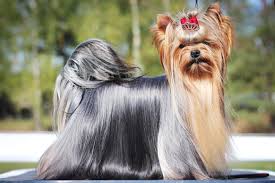
Yorkshire Terrier
Conditions of detention
Yorkshire Terriers are highly adaptable and can thrive in various living environments, including urban apartments and suburban homes. They are well-suited for indoor living but enjoy regular walks and playtime outdoors.
Useful Fact:
Yorkies are known for their bold and energetic personalities, making them excellent companions for families and individuals who can provide plenty of attention and stimulation.
Nutrition and diet
A balanced diet rich in high-quality proteins and essential nutrients is crucial for the Yorkshire Terrier to support its overall health and well-being. High-quality commercial dog food formulated for small breeds is recommended.
Useful Fact:
Feeding small, frequent meals can help maintain energy levels and prevent hypoglycemia, which is common in toy breeds like Yorkies.
Health
Yorkshire Terriers are generally healthy dogs but can be prone to certain genetic conditions such as patellar luxation, tracheal collapse, and dental issues. Regular veterinary check-ups are essential to monitor their health.
Useful Fact:
Dental care is particularly important for Yorkies, as their small mouths can lead to overcrowding and periodontal disease. Regular teeth brushing and dental check-ups are recommended.
Grooming and care
The Yorkshire Terrier has a long, silky coat that requires regular grooming to prevent tangles and matting. Daily brushing and regular trimming are needed to maintain their coat’s health and appearance.
Useful Fact:
Many Yorkie owners opt for a “puppy cut” to make grooming more manageable, especially for dogs that are primarily companions rather than show dogs.
Education and training
Yorkshire Terriers are intelligent and eager to please, making them relatively easy to train. They respond well to positive reinforcement and consistency.
Useful Fact:
Early socialization and obedience training are crucial to ensure they develop into well-mannered dogs that are comfortable around people and other animals. Despite their small size, they have a big personality and can be quite assertive.
Toys and entertainment
These dogs enjoy toys that challenge their minds and bodies, such as interactive toys, plush toys, and small fetch toys. Engaging in activities like obedience training and agility can be very stimulating for them.
Useful Fact:
Providing a variety of toys and regular playtime helps keep them mentally and physically active, preventing boredom and undesirable behaviors.
Safety
Due to their small size and delicate nature, Yorkshire Terriers should be supervised when playing with larger dogs and protected from high places they could fall from.
Useful Fact:
Supervision during outdoor activities and using a harness instead of a collar can help prevent injuries and ensure their safety.
Accessories
Comfortable harnesses and leashes are important for managing the Yorkshire Terrier during walks and outdoor activities.
Useful Fact:
A harness is often preferred over a collar for Yorkies, as it helps prevent strain on their delicate necks and reduces the risk of tracheal collapse.
Socialization
Yorkshire Terriers are friendly and form strong bonds with their families but can be wary of strangers. Early and consistent socialization is important to ensure they are comfortable in various environments.
Useful Fact:
Introducing them to different people, animals, and settings from a young age helps them become well-adjusted and confident adults.
Travel and Transportation
Yorkshire Terriers can travel well if they are accustomed to it from a young age. Ensuring they have a comfortable and secure space in the vehicle is important.
Useful Fact:
Using a pet carrier or a harness designed for car travel ensures their safety and comfort during trips.
Behavior and psychology
The Yorkshire Terrier is known for its bold, intelligent, and affectionate nature. They form strong bonds with their families and are naturally social dogs.
Useful Fact:
Understanding their lively and confident personality and providing proper training helps manage their behavior and ensures they are happy and well-behaved companions.
Legal aspects
Owners should comply with general dog ownership laws, such as licensing, vaccination requirements, and leash laws.
Useful Fact:
Keeping up with legal aspects ensures that Yorkshire Terriers are well-integrated into their communities and safeguards their health and well-being.


